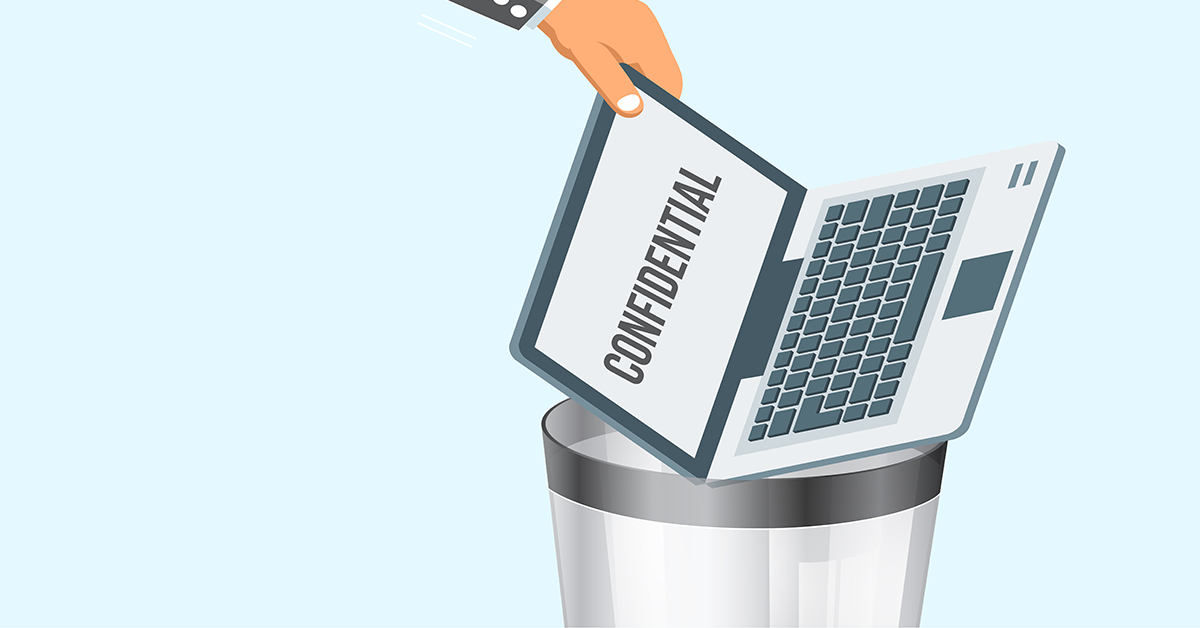Getting new computers for your business is exciting, but what happens to the old ones? Depending on the age, some people sell them or donate them, others throw them out. That’s the easy part. The problem is the sensitive data on them. There are passwords, account numbers, license keys, customer details, medical information, tax returns, browser history…. the works! Each computer, whether laptop, tablet or desktop, contains a treasure trove of sensitive information that cybercriminals would love to get their hands on.

I can just hit "delete" right?
Unfortunately, hitting delete on your files doesn’t actually make them disappear, nor does waving a strong magnet over the drive. These mistakes have cost businesses millions of dollars over the years.
Most businesses are unaware that specialized data cleanup is necessary, others think calling someone to collect the computers will cover all the bases. A 2016 experiment proved just how dangerous the situation can be when researchers bought 200 used hard drives and found that nearly 2/3s held unwiped, unencrypted sensitive data, including sales projection spreadsheets, CRM records, and product inventories. Frighteningly, they didn’t need any special hacking skills to get this data, it was all right there and helpfully labelled. It’s also not surprising that with simple data recovery tools, people have also been able to access British NHS medical records and missile data, all waiting patiently on a discarded hard drive.
Why hitting delete doesn’t help
Data on a hard drive works like a book with an index page. Every time data is written, it pops a quick entry into the index so when you need it again, it knows where to look. The index is used for files you create as well as system files you can’t even see. Sensible, right? When you delete a file, it should be the same thing as ripping the page out of the book right? Unfortunately no. Instead, it’s more like changing the index to say nothing is on page 10 and you can write something else there when you’re ready. But if you manually flip to page 10, you’ll find the information is still there - the file still exists until it’s been written over - it’s the index reference that got deleted.
Also, just like a book, if you write something over the information on page 10, that doesn't mean you still can't read the information underneath. It's much harder to do that (especially when a page has been written over several times) but still possible.
Wiping data before disposal
So how do you keep your data from falling into the wrong hands? Here are a few tips:
1. Use specialized formatting software - There are software tools available that can more securely erase drives. They do this by writing over the drive many times with 1s and 0s, effectively making the original data unreadable. Using software like this is not a quick process and not always 100% infallible but it generally does get the job done. It also allows you to keep the hard drive with the computer which can help increase it's resale value.
2. Physically destroy the drives - The premise here is prety straightforward: Before selling or giving away a system, remove the hard drive and manually destroy it. There are a variety of ways to do this ranging from drilling holes in it to disassembling it and shredding the disks platters (assuming it is a hard disk and not a solid state drive). While this has the benefit of being 100% irreversable, it does take a bit of manual work and can be messy.
3. Have it handled for you - The best option may be to have your IT provider handle this for you. A good IT business can help by maintaining an inventory of systems for you and handling the job of drive destruction and data security.
If you need an IT provider, give us a call. We can migrate any needed data, backup the information to your server or external drive, then wipe or destroy the hard drives for you. We can assess the age of your old computers and either dispose of them for you or point you in the right direction of computer recyclers. Plus, the quicker you dispose of your old computers, the easier the process will be. Recyclers will be able to send less of your equipment to landfill, and you’ll be less likely to forget how valuable the drive contents are.
We can also help plan for the future by giving you an inventory of all of your systems, new and old, and help you plot a budget road map and schedule for replacing systems on a regular basis.
Upgrading your business computers should be an exciting time for you and your employees, and with a little forward planning, you’ll be able to keep everyone smiling and all your data secure.
Need help with your old hardware? Get in touch with us. Click on the button below to get started today.